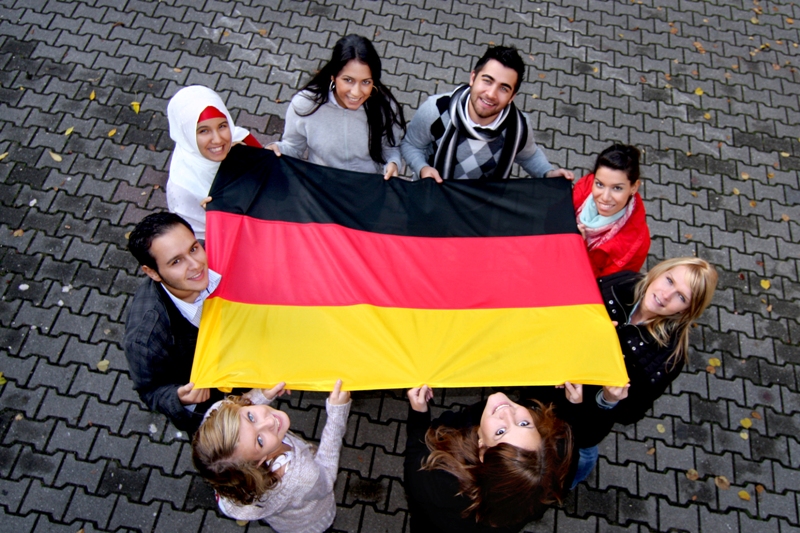Providing a counterpoint to the black-and-white narrative
Karen Krüger, journalist at culture desk of the conservative weekly Frankfurter Allgemeine Sonntagszeitung, has released a new book in which she embarks on a journey through what she terms an ‘Islamic Germany’, portraying diverse Muslim Germans in their daily lives.
Krüger’s self-professed goal is to show the diversity of the country’s Muslim population and the multifaceted nature of their religion, against the backdrop of a public perception of Islam as a monolithic unit: “My aim was to enable those Muslims to speak up whom you otherwise don’t hear because their religion simply is not bellicose.”1
Pre-empting potential criticism claiming that she hand-picked ‘liberal’ Muslims to portray in her book, Krüger states that “I only show liberal Muslims because the large majority of Muslims living in Germany is liberal. One just doesn’t notice them that often because they don’t appear as talk show guests, because they don’t attract attention through spectacular demonstrations.”2
Krüger thus seeks to work against a news cycle focused on terrorism and security concerns: “I wanted to confront this [focus] by showing that Muslims are not this homogeneous mass they’re often presented as in the media. It is really worth to look in people’s faces, to find contacts and to start a conversation with people – and then you will see that many [allegations] are not justified.”3
Deficits in incorporating Islam into society
The author also notes the toll that the ongoing barrage of media scrutiny and public suspicion is taking on German Muslims: “With most Muslims you can feel a great deal of hurt because due to the worldwide political situation many Muslims often experience rejection, even though they feel as a part of German society.” Krüger notes that among many Muslims this rejection leads to a latent yet perceptible state of grief.4
For Krüger, this state of affairs is a powerful driver of radicalisation: for young German Muslims, the starting point on the slippery slope towards jihadism is a situation in which “religion is transformed into an identitarian place of refuge” – a place particularly appealing to the children and grandchildren of Muslim immigrants who are neither deemed to be ‘properly German’ nor can simply claim to belong to their parents’ country of origin. Islam in general, and jihadist Islam with its transnational ideological and organisational structures in particular, appears to offer a way out of this dilemma.5
What is required, Krüger argues, are better educational efforts, in order to offer relevant and theologically sound instruction to young Muslims. This would pre-empt the need for an auto-didactic and haphazard engagement with Islam on shady online fora. More importantly, however, Krüger calls upon mainstream society to allow and enable a Muslim German identity to grow: “Surely not for everyone but at least for wide sections [of the population] it is not yet imaginable that ‘being German’ and ‘being Muslim’ do not have to exclude each other but can come together.”6
Krüger’s call comes at a particularly sensitive moment, as a number of conservative interior ministers of Germany’s federal states are putting forward drastic national security proposals. Among other measures on their list, they demand the prohibition of dual citizenship, a burqa ban, and tighter supervision of mosque finances.7
Criticism of the Turkish-dominated Islamic federations
Yet in Krüger’s view, the emergence of a Muslim German identity has not just been hampered by fears and prejudices on the part of mainstream society. She is acutely critical of the existing Islamic associations and federations in the country whom she deems unable to develop a way of thinking about Islam that resonates with the experience of ordinary German Muslims. Whatever progress has been accomplished in this regard has not been attained because of the work of the federations but rather in spite of them.
Krüger reserves her particular ire for DITIB, still the most powerful Islamic association in Germany. A subsidiary of the a Turkish government agency – the Presidency for Religious Affairs – she accuses DITIB of importing a kind of Turkish state Islam that is backward and ill-equipped to develop a constructive vision for Muslim life in Germany. Against this backdrop, the author conceives of the arrival of Syrian and other refugees as an opportunity to break the dominance of Turkish governmental Islam.8
This last point is of great salience in current German political debates. Diplomatic rows with the Erdogan administration have undermined the trust in the previously convenient arrangement that had outsourced Islamic religious services to Turkish government agencies. Unfortunately, however, virtually none of the voices present in these discussions offer constructive proposals as to how the gridlocked Islamic institutional landscape ought to be reformed. Krüger’s book appears valuable not as such an institutional blueprint but as a document of the diversity of Muslim life in Germany.
Karen Krüger, “Eine Reise durch das islamische Deutschland”, 352 pages, Rowohlt Berlin, 19,95 Euro
Sources
http://www.deutschlandfunk.de/islam-in-deutschland-syrische-muslime-koennten-eine-chance.886.de.html?dram:article_id=361756 ↩
http://www.br.de/radio/bayern2/kultur/diwan/karen-krueger-reise-durch-das-islamische-deutschland-100.html ↩
http://www.br.de/radio/bayern2/kultur/diwan/karen-krueger-reise-durch-das-islamische-deutschland-100.html ↩
http://www.deutschlandfunk.de/islam-in-deutschland-syrische-muslime-koennten-eine-chance.886.de.html?dram:article_id=361756 ↩
http://www.deutschlandfunk.de/islam-in-deutschland-syrische-muslime-koennten-eine-chance.886.de.html?dram:article_id=361756 ↩
http://www.deutschlandfunk.de/islam-in-deutschland-syrische-muslime-koennten-eine-chance.886.de.html?dram:article_id=361756 ↩
http://www.n-tv.de/politik/Union-will-Anti-Terror-Gesetze-verschaerfen-article18381011.html ↩
http://www.br.de/radio/bayern2/kultur/diwan/karen-krueger-reise-durch-das-islamische-deutschland-100.html ↩






